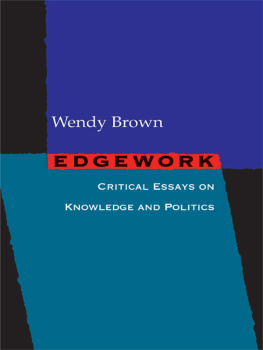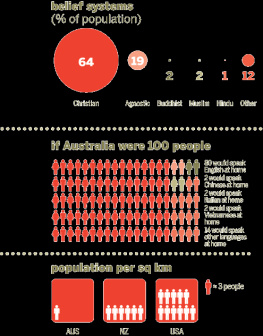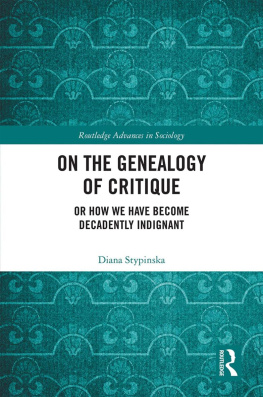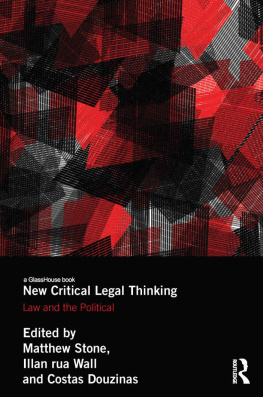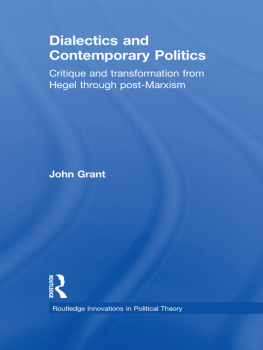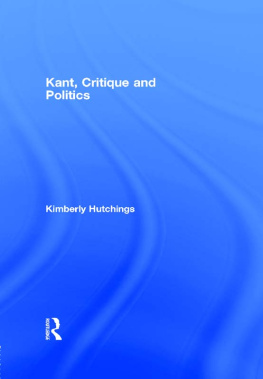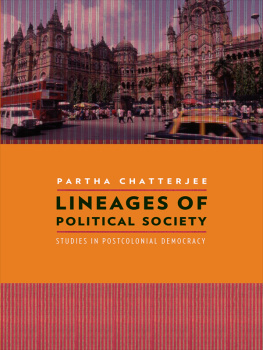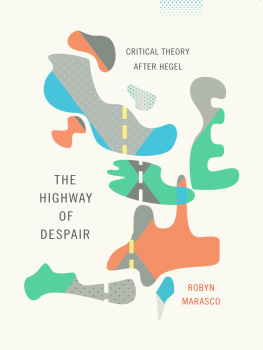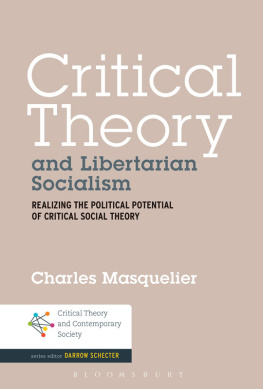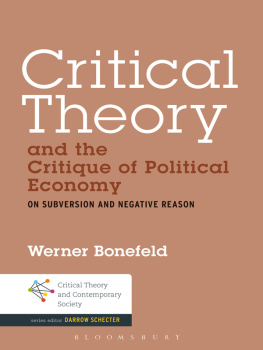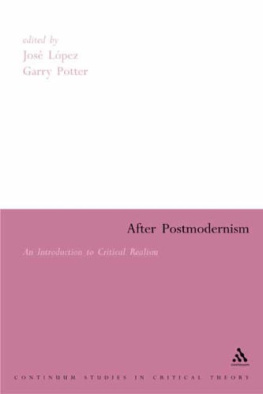E D G E W O R K
E D G E W O R K

CRITICAL ESSAYS ON
KNOWLEDGE AND POLITICS
Wendy Brown
P R I N C E T O N U N I V E R S I T Y P R E S S
P R I N C E T O N A N D OX F O R D
Copyright 2005 by Princeton University Press
Requests for permission to reproduce material from
this work should be sent to Permissions,
Princeton University Press
Published by Princeton University Press,
41 William Street, Princeton,
New Jersey 08540
In the United Kingdom: Princeton University Press,
3 Market Place, Woodstock,
Oxfordshire OX20 1SY
All Rights Reserved
Library of Congress Cataloging-in-Publication Data
Brown, Wendy.
Edgework : critical essays on knowledge and politics / Wendy Brown.
p. cm.
Includes bibliographical references and index.
eISBN-10: 0-691-12360-8 (cloth : alk. paper)
eISBN-13: 978-0-691-12360-8 (cloth : alk. paper)
1. Political science. 2. Feminist theory. I. Title.
JA71.B758 2005
20'.1'10823dc22 2005050497
British Library Cataloging-in-Publication Data is available
This book has been composed in Palatino Typeface
Printed on acid-free paper.
pup.princeton.edu
Printed in the United States of America
1 3 5 7 9 10 8 6 4 2
CONTENTS
Preface
PREFACE
EACH of these essays was written for a particular occasion: a conference keynote address, a topical anthology, a special issue of a journal. Such occasions mimic, in certain ways, the experience of the political realm: one is challenged to think here, now, about a problem that is set and framed by someone else, and to do so before a particular audience or in dialogue with others not of ones own choosing. These conditions bear enough similarities to some of the constraints and demands of thinking that must respond to given political circumstances to offer good practice for political theorists, who are often removed from the unique rhythms and constraints of political life. Moreover, as these occasions productively divert scholars from our own research questions, they free us to think more broadly, more speculatively, and more dialogically than usual.
As critiques of particular discursive, institutional, or political practices, these essays are endeavors in what Foucault termed the local character of criticism he considered appropriate to post-Enlightenment thinking. Local criticism, which Foucault paired with the emergence of the specific intellectual (contrasted with the universal intellectual), resets the compass points of critical theory that are derived from its Kantian-Hegelian-Marxist heritage. It replaces critique of an imagined social totality and an ambition of total transformation with critique of historically specific and local constellations of power and an ambition to refigure political possibility against the seeming givenness of the present. While these replacements are sometimes disapprovingly read as a retreat from universal, normative, and politically revolutionary investments, such disappointment makes sense only if one remains gripped by the ontological and epistemological premises whose very critique has occasioned the shift away from social totalities and universal norms. If one instead rejects the idea that social orders are unified and bounded, that they are organized and moved by a single kind of power, that this power can be grasped and replaced to achieve emancipatory social transformation, that this power can be theorized objectively, and that social and political theory are thus appropriate candidates for science, then local criticism, rather than downgrading the project of critical theory, articulates potency and humility vis--vis both the complex powers producing the present and the difficult task of apprehending this present. From this perspective, critical theory becomes more radical and more efficacious as it surrenders universal and comprehensive aspirations, as it engages historically and culturally specific powers, problems, and knowledges.
Each of these essays begins with a concrete problem: for example, the relationship of loyalty, love, and dissent in contemporary American political life; the emergence of neoliberal rationality as a form of governmentality; the current intellectual disorientation of womens studies programs; or the identity crisis of political theory in relation to recent historical disseminations of the political and the theoretical. Such problems are rendered as markers of political or intellectual landscapes themselves in need of rethinking in order to articulate political possibilities beyond those offered by the existing discursive framing of the problem. The purpose is not to reveal the Truth of a particular problematic, or to get to the bottom of it. Rather, the point is to critically interrogate the framing and naming practices, challenge the dogmas (including those of the Left and of feminism), and discern the constitutive powers shaping the problem at hand. Boundaries, naming practices, dogmas, and constitutive powers are among the objects of local criticism; interrogation, challenge, discernment, and displacement are among its actions. These relatively modest objects and practices offer an alternative to the more grandiose ones of an earlier instantiation of critical theory, in which what was at stake was nothing less than apprehending systems and totalities; identifying essential principles, powers, or sources of historical movement; and providing the key to their overcoming.
The essays assembled in this volume traverse, and in some cases link, disparate intellectual orbits and idiomsfor example, political theory and womens studies, or left activists and liberal scholars of politics. It is my hope that when they are read as a collection, these relatively distinct communities might consider new ways of engaging their own dilemmas by considering how they take shape elsewhere. Another line of division between these essays is that some were prepared as public addresses while others were conceived from the beginning as contributions to written symposia even if they were first delivered as papers. In the case of chapters 1 and 6, I have chosen to leave their talk style intact, since, in addition to informality, the medium elicits potentially politically useful qualities of urgency and insistence.
The first three essays were written for events focused on the sea change in political concerns and political consciousness in the aftermath of September 11. Untimeliness and Punctuality was the keynote address for a 2004 conference of political theory graduate students titled Critical Theory in Dark Times. Political Idealization and Its Discontents was written for a 2002 seminar, Dissent in Dangerous Times, a convocation of liberal and left scholars of American law and politics responding to the immediate post-9/11 chill in American public discourse. And Neoliberalism and the End of Liberal Democracy was first offered to a 2003 symposium titled The Left, After... , which aimed to consider the thinking and practice of the American Left two years after 9/11.
The fourth essay, At the Edge, responded to an invitation to reflect on the present and future of political theory at a session of the American Political Science Association annual meeting titled What Is Political Theory Today? The fifth essay, Freedoms Silences, pivots between the more generic contexts of the preceding essays and the forthrightly feminist ones of the two that follow. Freedoms Silences was presented at a set of events on censorship sponsored by the Getty Institute; originally prepared for a conference titled Silencing Women: Feminism(s), Censorship, and Difference, it was also presented at the final gathering in the series, Censorship and Silencing: Practices of Cultural Regulation, which cast a wider net over the problem of censorship.
Next page
